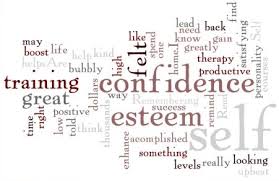
Self-Esteem Defined
Self-Esteem refers to how you think and feel about yourself. It is your sense of self-worth, your belief about how valuable and worthy a person you are. People with high self-esteem feel good about themselves and people with low self-esteem feel badly about themselves.
How do we get self-esteem?
Self-esteem usually comes from messages you get about yourself. These messages can come from other people (parents, teachers or friends) or from you. When we get messages from other people that tell us we are ‘bad,’ we often learn to tell ourselves that we are bad or unworthy and we develop low self-esteem. When we get messages from other people that tell us we are ‘good’, we usually learn to tell ourselves that we are good and valuable people and we develop high self-esteem.
What does self-esteem have to do with relationships?
The messages we get from people we care about have a very strong effect on our self-esteem. If you are in a healthy relationship, your partner probably acknowledges your strengths and positive qualities, has confidence in your ability to make good decisions, trusts you and encourages you to pursue your goals. Having a supportive person like this in your life probably makes you feel good about yourself, so your self-esteem improves. If you are in an unhealthy relationship, your partner might put you down, blame you for all the problems in your relationship and discourage you from activities that will help you grow as a person. Even if you have high self-esteem when you start your relationship, if you are around an emotionally abusive person for long enough, your self-esteem will eventually get lower.

How can I build my self-esteem?
Self-esteem doesn’t only come from the messages other people send you – it also comes from the message you send yourself, called ‘Self-Talk’. If you are used to hearing negative messages from other people, chances are you will send yourself negative messages too.
Some examples of negative self-talk are things like “I’m so stupid,” “I’m not good enough at this” or “I can’t do this.”
One way to build your self-esteem is to re-train yourself to engage in positive self-talk. Positive self-talk is when you focus on your strengths and positive qualities, reminding yourself that you are a good and valuable person. You have the power to override negative messages from yourself and others with positive self-talk.

Some examples of positive self-talk:
- “I am a good and caring person and I deserve respect.”
- “There are people who love me and will be there for me when I need them.”
- “I deserve to be happy.”
- “I am entitled to make mistakes and learn from them.”
- “I can do this.”
Choosing to participate in positive self-talk on a regular basis will form a habit that will build your self-esteem.
Other ways to build your self-esteem:
- Be kind to yourself
- Exercise regularly
- Take up a hobby and/or learn a new skill
- Have some fun and/or be creative
- Help others
- Relax
- Eat healthy
- Balanced sleep routine
- Connect with others
- Avoid drugs and alcohol as coping mechanisms
- Focus on the bigger picture
- Accept where you are in the moment
What is Body Image?
Much like self-esteem, body image is a concept that can be influenced by surroundings as well as the person themselves. Body image is the mental picture one has of their body. It includes attitudes and feelings about how one looks and how other’s perceive them.


